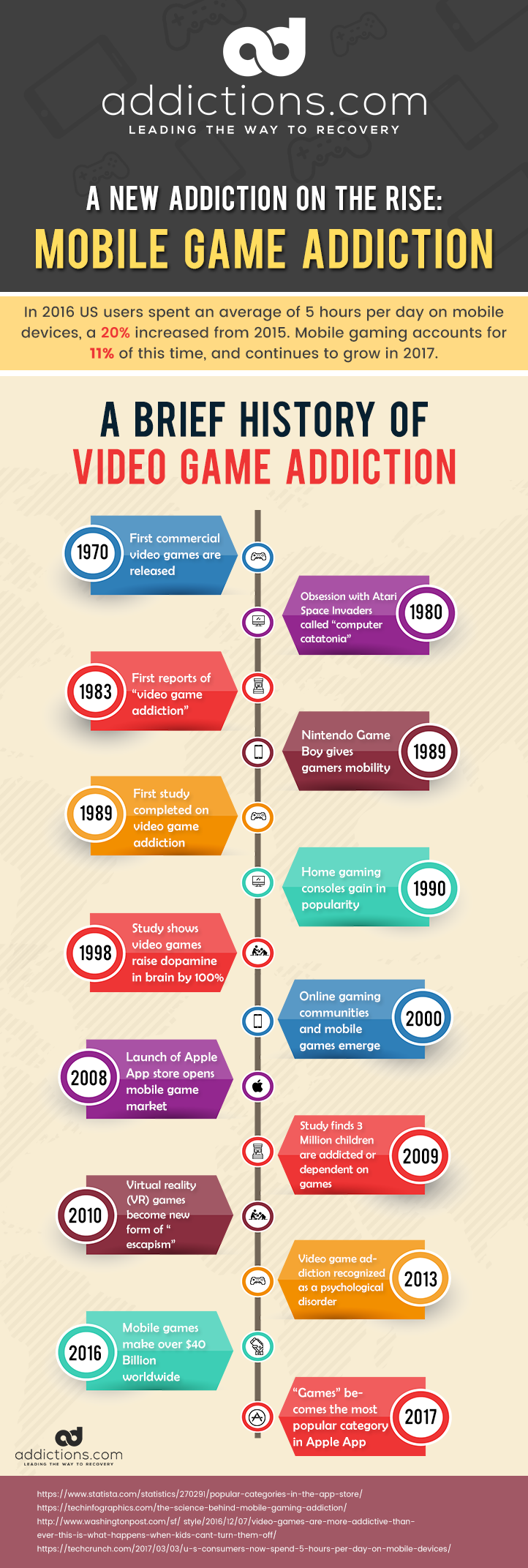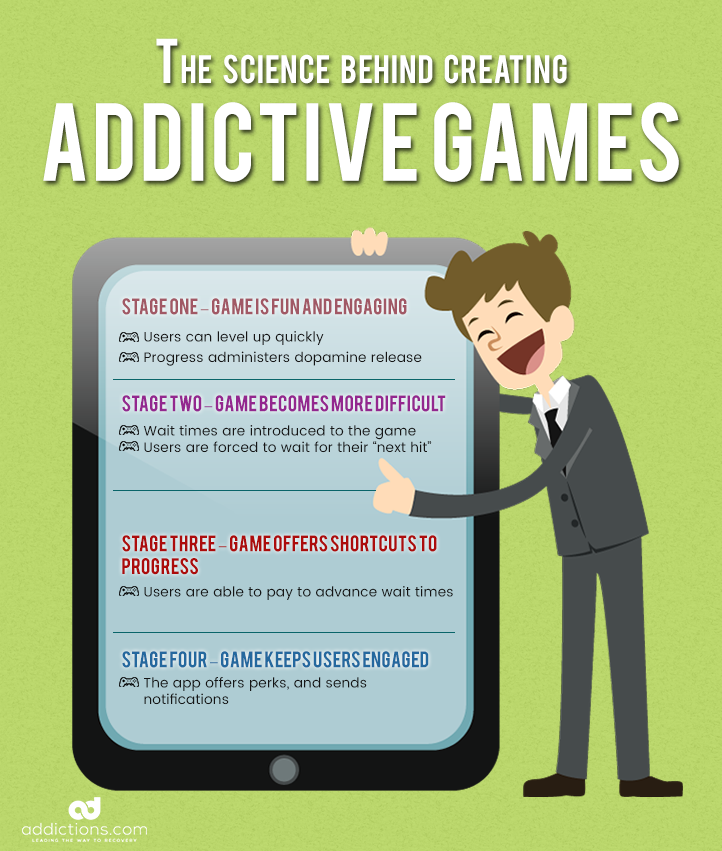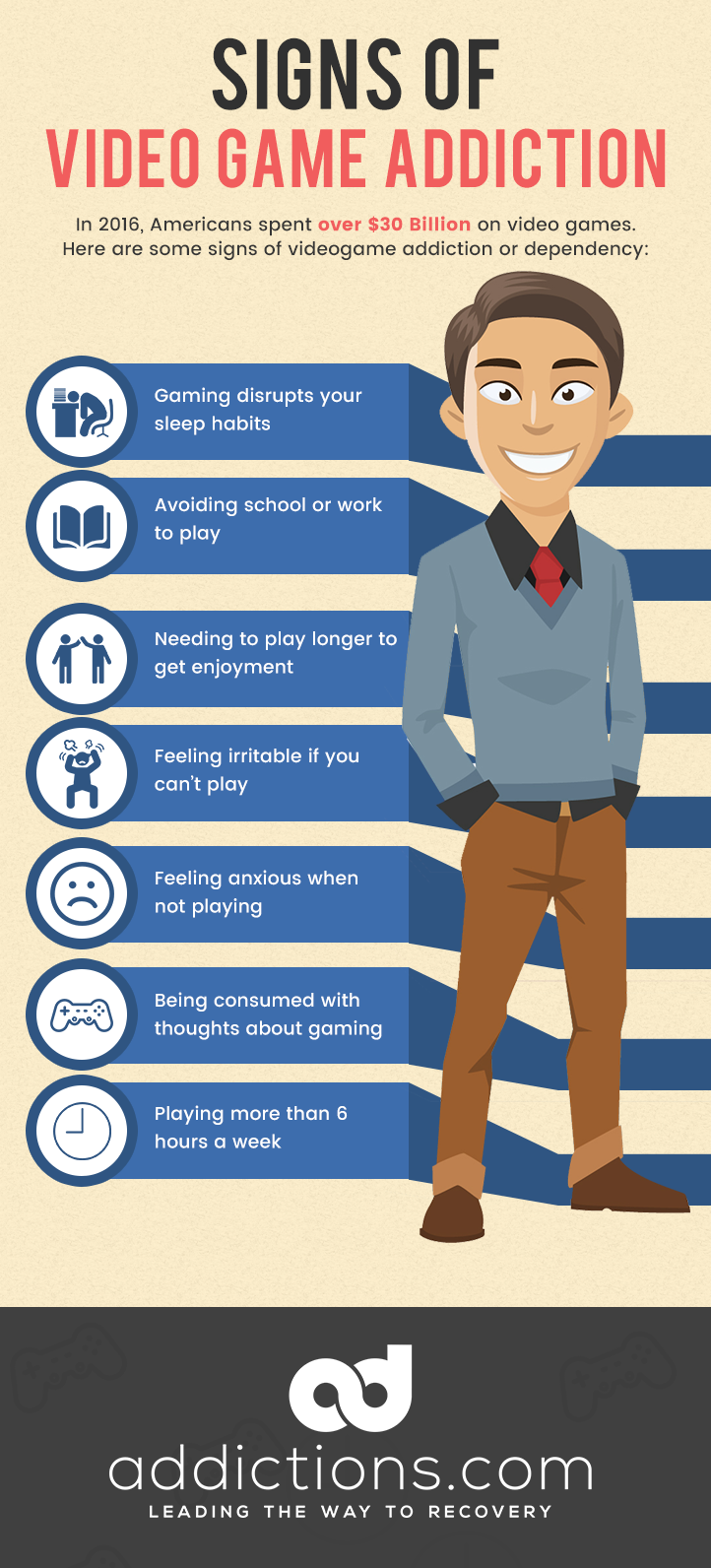Video games can offer players a much-needed escape from the daily grind of work, family, education, and other important life responsibilities. When enjoyed in moderation, video games offer great entertainment, can improve cognitive skills and hand-eye coordination, and can even help you relax and wind down after a busy day.
In 2024, Americans spent $58.7 billion on purchases related to video games, which are now more accessible than ever thanks to mobile devices. Anyone with a smartphone or tablet can instantly lose themselves in a fun game of Call of Duty: Mobile, Roblox, or Pokémon Go, regardless of time or place.
On the flip side, playing video games too often for more than several hours per day can negatively impact one’s overall health and livelihood, leading to problems with finances, education, social relationships, and addiction. Mobile game addiction is increasingly on the rise in the U.S., especially since mobile devices have made it easy for users to access thousands of games with just a few taps.
Here’s a close look at mobile game addiction, how developers keep you hooked, and what you can do to prevent mobile game addiction from becoming a problem in the first place.
A Brief History of Video Game Addiction
Video game consoles first appeared in U.S. homes during the early 1970s with the release of Atari and Odyssey game systems, but it wasn’t until the early 1980s that reports of video game addiction began circulating in medical journals. Studies conducted on video game addiction during this period were mostly limited and inconclusive, and only involved feedback from teenage males who played at local arcades.
During the 1990s, psychologists started to include data on home consoles, computers, and handheld devices in their research on video game addiction. Again, these studies were limited to male youth who had self-diagnosed video game addictions. This disorder became more closely scrutinized during the 2000s, when the release of realistic-looking games, multiplayer online role-playing games, and mobile games started triggering a rise in behavioral disorders and video game addiction among U.S. families.
In recent years, studies on video game addiction have expanded to include subjects of all genders, age groups, and socioeconomic backgrounds. Studies have shown that video game addiction can negatively alter one’s personality and behavior, and lead to serious health conditions including ADHD, anxiety disorder, and depression.
Long-term effects of video game addiction may also include learning disabilities, weight gain, and aggressive thoughts and behaviors that can become more dangerous with time.
Addictive Gaming in Today’s World
Years ago, those who struggled with video game addiction would be required to stay at home or visit arcades to fuel their addiction. Today, addicted gamers can feed their addiction conveniently at any time directly from their mobile devices. Gamers can log in to play at work, at school, and at times usually reserved for close friends and family.
Virtual reality gaming, also known as immersive gaming, is a major culprit behind the rise in video game addiction. Psychologists say that since virtual reality games offer players a sense of escapism, these games can make the real world seem more dull in comparison. This factor is what fuels many cases of video game addiction, since users are drawn to more engrossing, interactive worlds that allow them to escape underlying problems in the real world such as stress, trauma, and depression.
Research shows that young children are most susceptible to video game addiction, since many in this age group generally lack the self-discipline needed to limit the amount of time they spend playing games.
Additionally, many children struggle with distinguishing fact from fiction in virtual reality and are easily influenced by games that condone violence and negative behavior. When exposed to a significant amount of gaming at a young age, children are at higher risk for addiction and other behavioral health problems that develop later in life.
How App Game Developers Keep You Hooked
If you’ve ever played games on your mobile device, you may already understand how easy it can be to lose track of time when you’re solving fun puzzles, slaying enemies, or chasing after fictional characters in a virtual reality setting.
Mobile game developers use several tactics and strategies to purposely keep you playing and feed your addiction. Bright colors, detailed graphics, and positive sounds and music will keep you coming back for more — sometimes even several times per day.
Freemium games are a leading driver behind mobile game addiction, which are free to install, but give you the option to make in-app purchases that allow you to progress further in the game. Popular freemium games today include Candy Crush Saga and Genshin Impact.
Games are the number one downloaded app category on iOS and Android devices. Games represent roughly 70% of all app installs on iOS, and make up roughly 92% of all app revenue on Android via Google Play.
The Link Between Dopamine and Mobile Game Addiction
Game developers keep you hooked by using strategies designed to increase a player’s dopamine levels. Dopamine is a brain chemical responsible for controlling your emotions and feelings of pleasure. Playing video games will increase a player’s dopamine levels upon completing a difficult level or earning a reward of some kind.
Increased dopamine levels are a major contributing factor to most addiction types, including addiction to substances such as alcohol, heroin, and prescription drugs. Those who struggle with addiction often drink more alcohol and use higher doses of drugs to achieve higher dopamine levels. In instances of video game addiction, players spend more money and more time on games that help them achieve heightened feelings of reward and pleasure.
Mobile game addiction is commonly compared to gambling addiction, since both addiction types are described as impulse control disorders and affect the brain’s dopamine levels in similar ways to keep individuals coming back for more.
Many times, people who suffer from video game addiction also suffer from one or more mental health disorders that may be driving their addiction, such as PTSD or bipolar disorder. This is known as a dual diagnosis or co-occurring disorders, and can be effectively treated using counseling and behavioral therapies.
Problems Associated with Mobile Game Addiction
Mobile game addiction and video game addiction in general increase a person’s risk for many physical and psychological health problems, as well as problems that interfere with one’s overall livelihood.
In terms of physical and mental health, the long-term effects of video game addiction can lead to major health problems that often require serious treatment. For instance, those who neglect sleep and food in favor of playing video games can eventually go on to suffer insomnia, weight gain, and malnutrition.
Problems commonly associated with video game addiction:
- Neglecting personal hygiene: Those addicted to video games tend to care less about their hygiene since they spend less time in social settings and more time alone playing games.
- ADD and ADHD: These hyperactivity disorders are highly common among video game addicts due to the high interactivity levels of most of today’s video games.
- Learning disabilities: Those used to progressing quickly in intense video games often suffer learning disabilities when spending time in the real world.
- Loss of personal relationships: Addicted gamers often devote more time to video games than to friends, family, and social activities.
- Weight gain and obesity: Those addicted to video games often spend less time outdoors and being physically active, which increases the risk for weight gain, obesity, and related conditions like type two diabetes and heart disease.
- Stress: Video game addiction can lead to stress when players are unable to pass difficult levels or achieve certain rewards. Stress can also occur when players face life problems with work, education, and family due to their gaming addiction.
- Restlessness and anxiety: Those addicted to video games often become anxious and restless when they’re unable to play video games for any reason.
- Poor nutrition: Addicted gamers usually neglect nutrition and opt for frozen meals, fast food, and other convenient, unhealthy options. Poor nutrition can lead to nutritional deficiency, and problems with diabetes and weight gain.
- Arthritis and carpal tunnel syndrome: Those who perform repetitive movements with their fingers and wrists playing mobile games can develop arthritis and carpal tunnel syndrome.
- Sleep disorders: Addicted gamers who stay up late in the night playing games can suffer sleep disorders like insomnia that increase the risk for illness and disease — including cancer.
- Aggressive thoughts and behaviors: Children and youth who become addicted to video games tend to display aggressive thoughts and behaviors as a direct result of prolonged video game exposure.
Preventing Video Game Addiction
Video game addiction can often be prevented by limiting the amount of time one spends playing video games and by recognizing common symptoms of video game addiction. Parents can monitor their children’s mobile game usage, and encourage them to participate in other activities such as outdoor games, exercise, and reading.
Common signs and symptoms of video game addiction:
- Devoting an increasing amount of time to video gaming as days, weeks, and months start passing
- Falling asleep at work or school after playing video games
- Decline in performance at work or school
- Being constantly preoccupied with thoughts about video games
- Feelings of irritability, depression, and anxiety at the idea of spending less time gaming
- Failing to complete work or school assignments on time due to excessive video gaming
- Repeated failed attempts at trying to cut back on time spent playing video games
- Loss of interest in hobbies and activities unrelated to video games
- Loss of personal relationships due to excessive video gaming
- Using video games as a way to self-medicate for feelings of guilt, anxiety, depression, and stress
Video games can be fun and stimulating when played in moderation for no more than one or two hours per day. If you’re a parent with children who play video games, educate your children about the importance of limiting video game time, and introduce them to other healthy fun activities that keep them distracted from the urge to play video games.
Also, consider using video games as a reward for when your children complete chores, homework, and other important tasks to lower their risk for addiction.
How to Treat a Video Game Addiction
Video game addiction is often treated using counseling and behavioral therapies that teach individuals how to avoid turning to video games as a way to escape real life. Many times, video game addiction stems from underlying problems such as stress and mental health disorders, such as depression and social anxiety. Individuals who suffer from video game addiction often use video gaming to avoid and cope with life’s biggest stressors.
Treatments for video game addiction are often tailored to each individual patient based on their unique, personal struggle with gaming addiction. For instance, those facing a years-long video game addiction may benefit most from residential inpatient treatment so they can redevelop healthy daily routines without access to video games.
Alternately, those who struggle with video game addiction due to boredom can undergo cognitive-behavioral therapy in outpatient settings. This helps them retrain their brains to think about other ways in which to overcome boredom.
Twelve-step support therapy, group and family counseling, and wilderness therapy are other common treatments that can help you or a loved one overcome video game addiction. If you’re ready to start your recovery journey, reach out today.



